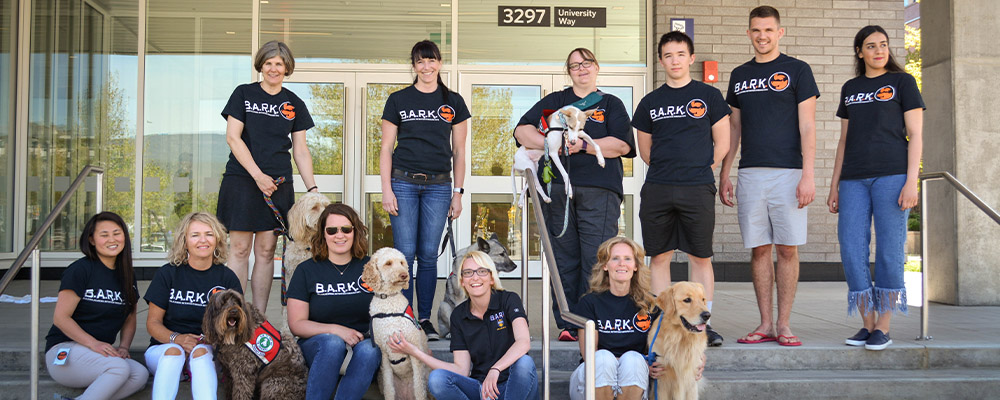Volunteer Handler

In addition to assessing dogs for their suitability for B.A.R.K. programming, handlers must meet certain criteria too. This includes:
- Having strong command over their dog’s behaviour in public
- Use proactive rather than reactive management techniques
- Having an interest in, and personality suitable for, working with college-age students
- Having a low-desire to problem-solve (fix students’ problems) and are able to redirect students to services on campus
- Volunteers are asked to participate in three B.A.R.K. events each semester
- Must submit a Criminal Records Background Check (cost incurred by volunteer and to be done at their local RCMP)
- Must attend B.A.R.K. Training Sessions (e.g., information sessions for handlers, mock sessions to orient to the B.A.R.K. model, etc.)
- Willingness to uphold the B.A.R.K. mission of supporting the social and emotional well-being of students through animal-assisted therapy.
- Openness to feedback as we move toward cultivating a deep pool of well-qualified volunteers
Internship Phase
Once a dog and handler have successfully passed the assessment and been recommended for acceptance by all of B.A.R.K.’s adjudicators, handlers will begin an internship/training phase. Once this training is complete, volunteers will be included in the email list and receive announcements regarding B.A.R.K. programming. Volunteers are asked to commit to a minimum of three visits per semester once programming is underway.
All B.A.R.K. dogs are fitted with a red therapy vest. This vest must be worn whenever the dog is on campus and is not to be used for other purposes (e.g., to take the dog in public spaces where dogs are typically forbidden). Upon full acceptance into the program, handlers are given a parking code to cover their parking while working on behalf of B.A.R.K.
How to Apply
Interested volunteer handlers can submit an application to be placed on our waitlist.
We may contact you if we have additional questions, concerns, or if your application does not meet our selection criteria (e.g. not a local resident or your dog shows signs of nervousness around other dogs). We typically complete a New Dog Intake Assessment once a year, usually in the fall.
If you have questions about becoming a volunteer handler, please email us at bark.dogtherapy@ubc.ca.